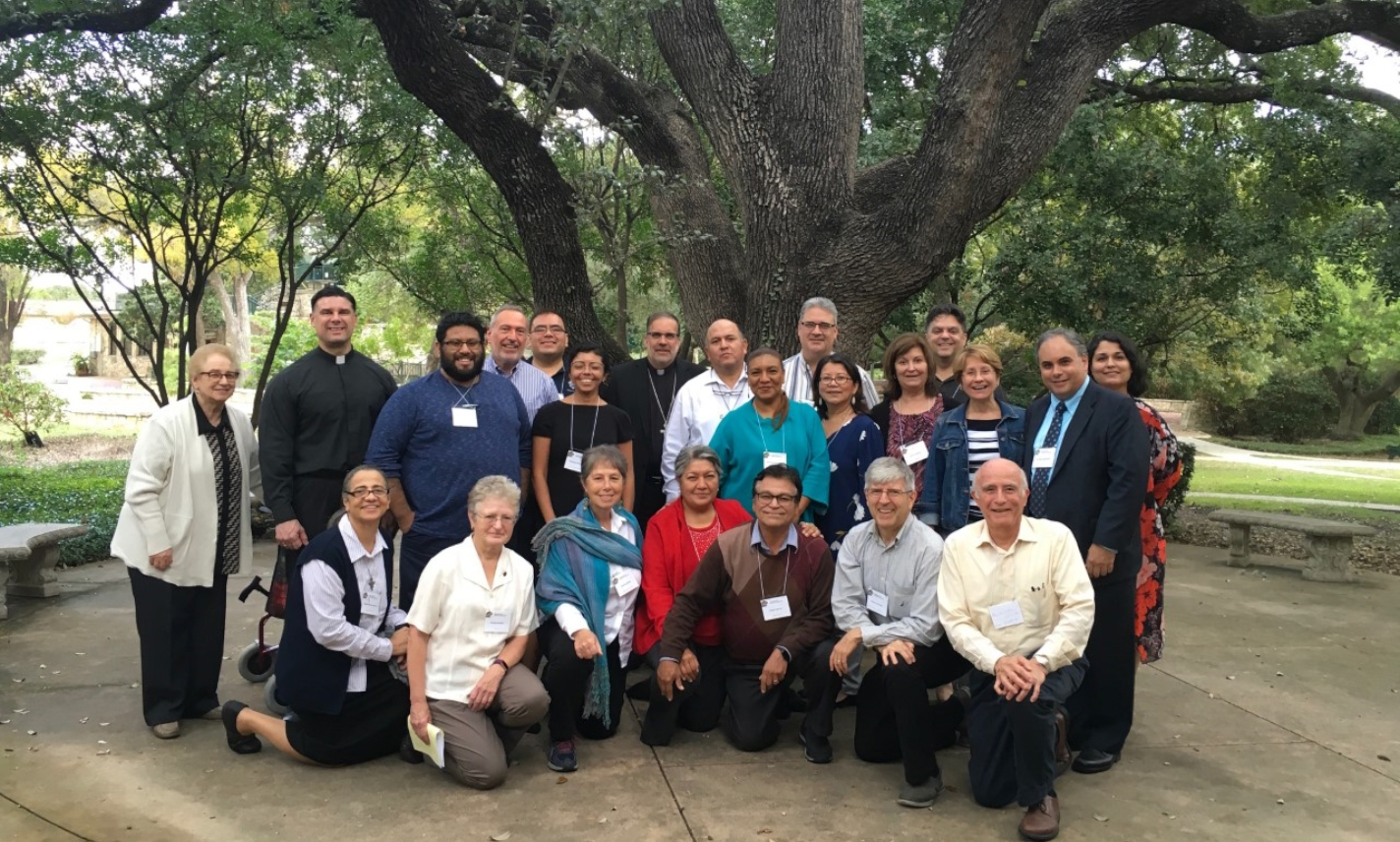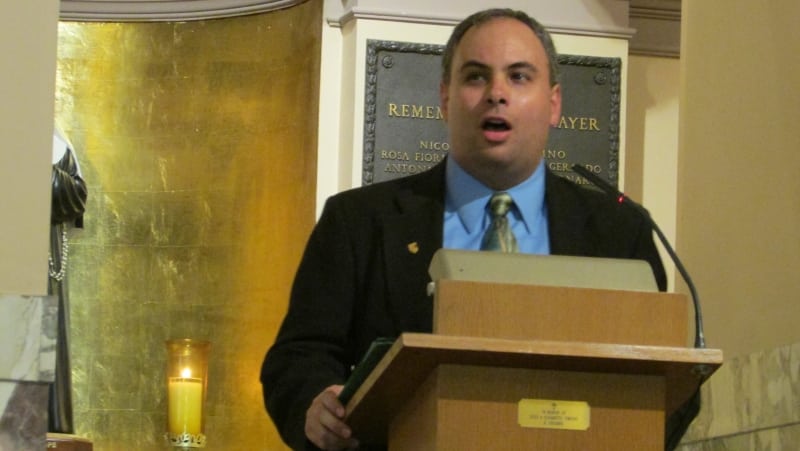The following is the text I prepared and shared with family and friends gathered to celebrate the conferral of the Degree of Doctor of Philosophy in Historic and Systematic Theology upon my by the Catholic University of America. The celebration, the second of two, each a week apart, took place at Ventura’s Restaurant in my hometown of Utica, New York on Trinity Sunday, May 22, 2016. The prior one was in Washington, D.C.
My reflection is based upon the following reading from Philippians 2:1-13
If then there is any encouragement in Christ, any consolation from love, any sharing in the Spirit, any compassion and sympathy, make my joy complete: be of the same mind, having the same love, being in full accord and of one mind. Do nothing from selfish ambition or conceit, but in humility regard others as better than yourselves. Let each of you look not to your own interests, but to the interests of others. Let the same mind be in you that was in Christ Jesus,
who, though he was in the form of God,
did not regard equality with God
as something to be exploited,
but emptied himself,
taking the form of a slave,
being born in human likeness.
And being found in human form,
he humbled himself
and became obedient to the point of death—
even death on a cross.
Therefore God also highly exalted him
and gave him the name
that is above every name,
so that at the name of Jesus
every knee should bend,
in heaven and on earth and under the earth,
and every tongue should confess
that Jesus Christ is Lord,
to the glory of God the Father.
Therefore, my beloved, just as you have always obeyed me, not only in my presence, but much more now in my absence, work out your own salvation with fear and trembling; for it is God who is at work in you, enabling you both to will and to work for his good pleasure.
On the Commemoration of the Conferral of my Doctoral Degree
Trinity Sunday, May 22, 2016
Ventura’s Restaurant | Utica, NY
I recently read a quote online about teaching and learning that seems thoroughly appropriate for this gathering today and which I think is also a very compact summary of what Paul was trying to convey to the Philippians in his letter to them, and especially in the passage we have just heard proclaimed. It is also appropriate on this date in the church when we celebrate Pentecost – the gift of the Holy Spirit, whom John’s Gospel reminds us is the perfect Teacher.
The quote was: “We are all teachers; and what we teach is what we learn, and so we teach it over and over again until we learn.”
We – all of us – teach so that we, ourselves, as well as others, might – one day – learn. And in learning, understand. And in understanding, act.
This quote also reminds me of one of my mentors, the late Fr. Patrick Granfield, who went home to God suddenly in 2014. In addition to his understanding of communication and conflict in the church being one of the subjects of my dissertation – Fr. Granfield was also my academic advisor during a large portion of my time at Catholic University – and always a great supporter of my work, as he was with all of his students. He was an embodiment of a teacher who was always learning, always interested in what you were thinking, willing to listen, willing to think about things in new ways, so it seemed appropriate that when it came time to formally deposit the dissertation that bore the imprint of so much of his thought, that it should be dedicated to his memory which lives inside me and the many hundreds of students he touched in his 40+ years of teaching.
I won’t bore you with a string of quotes from my dissertation, but I will mention one – which comes from Fr. Granfield’s remarkable book Theologians at Work in which he, in the 1960s, set about to interview 16 theologians – 15 Christians and 1 Jewish Rabbi – Abraham Heschel – about their works. In the introduction to that book Fr. Granfield spoke about the role of theology in the church:
“I believe that the modern theologian must operate in, for, and through the community of love and worship that is God’s people. This is necessary because the Word of God is given to the community which is called, established, and sustained by this selfsame Word. Theology is a quest within the community for the genuine understanding of God’s Word in all its purity and clarity. … The quest for truth is at stake here. It is the concern of the whole community that is aware of its unique place in the world. The theologian is a servant of the community.”
I share this vision of what the theologian is for the life of the church today. It is so important that that vital connection between the lived faith of the church and its intellectual expression be maintained. It is not enough for the ecclesial theologian to be a critical scholar, though she or he must unquestioningly be – even when such scholarship might shake lose unexamined presuppositions about church teaching that would benefit from shaking.
The theologian must be vitally connected to the community of the church – the very life of the People of God – for without such a connection, theology runs the risk of becoming what Fr. Granfield called “an intellectual exercise remote from the real world,” or, as he more succinctly and accurately put it, “a dead theology.” He continued,
“Theologians who do not relate to the world around them and address the realities of others only in an ‘hypertheological’ way distort the beauty and true function of theology. What is needed is Servant-Theology, and the theologian must be a diakonos – a servant of the whole community of the church which deals with personal truths, our encounter with God, and our final destiny.”
+ + +
Enter Paul’s Letter to the Philippians – which I selected as today’s reading because of its importance to my own formation as a lay minister and as a theologian and the value I know it has as getting to the essence of the Christian life.
“Let the same MIND be in you that was in Christ Jesus.” Paul writes to the believers in Philippi.
But, you see, “mind” isn’t the best English rendering of Paul’s Greek. I know, because I struggled through biblical Greek for a year and retained precious little, but thanks to those skills, a Greek/English New Testament and a dictionary, I did a little exegesis of this text.
I discovered that the word being translated as “mind” here is the Greek word phronete, a form of the noun phronesis, the meaning of which isn’t quite carried well by the word “mind.” Oh the word phronesis is connected to an understanding of knowledge, much like its antonym gnosis, which means “religious knowledge.” But phronete or phronesis refers to a different type of knowing; it is more of a “practical wisdom” requiring “an ability to discern how or why to act virtuously and to encourage practical virtue, excellence of character, in others.” Its a different type of spiritual knowledge – not about only what you know but what you do with the knowledge. That’s phronesis.
And you can perhaps see why “Let the same mind be in you that was in Christ Jesus …” is a translation of phronete that – apologies to the translators who worked long and hard here – isn’t quite up to the task of conveying Paul’s meaning.
It’s doubly challenging as well, because our Western understanding of mind is all about what’s in your head. From the neck up. Its about information; how much you can store up here and use when you need it. To solve some problem. To analyze something.
But, Paul, is a Jew. He may be known as apostle to the Gentiles, but he is a Jew, through and through. And although he’s writing in Greek, he knows his Hebrew. Which is why he uses phronete and not gnosis to talk about what was in the “MIND” of Jesus Christ and how those believers at Philippi – and how we – should be like him.
Because in the semitic understanding of “mind” which Paul is thinking about – the mind isn’t all in your head. Mind isn’t only about knowledge; its about the human capacity to take in information, sure, but to also take in life experience, lived experience – hard won, suffered through – and to let it be inside you, become a part of you, and so be expressed in your life.
The Hebrew notion of “mind” isn’t about theory and information; it is about seeing life through its experience and bringing information and reflective thoughtfulness together to BECOME what we might better call today SPIRITUAL WISDOM.
So Paul, knowing his tradition, knowing his mostly Greek audience, is looking for the best Greek word he can find to convey THAT understanding of knowledge. So he uses the word phronete. And it can perhaps be better translated in English:
“Let the same WISDOM be in you that was in Christ Jesus.”
That’s what Paul is getting at. That’s what he’s trying to say: Let the practical, moral wisdom; the life of virtue; the life of REAL CONCRETE active faith – Let THAT wisdom be in you like it was in Christ.
Let Christ’s way of living, and acting, and dying and reliance on God be in you – THAT wisdom, THAT knowledge THAT phronete which we’ve celebrated for 50 days of this Easter Season, which we celebrated on Pentecost and today, on Trinity Sunday, and which we keep teaching ourselves OVER and OVER again UNTIL WE LEARN.
And – lest we try to get around what PRECISELY that phronete – that hard won wisdom of Christ- is – which we should try to have in our minds and hearts – You know: Paul’s gonna do what Paul’s gonna do – remind the Philippians, and us, in no uncertain terms.
He uses what scholars have said is a well-known hymn to Christ about his death and exaltation – seemingly known by many in the early church- to get the Philippians and us to “know” PRECISELY the shape Jesus’ own WISDOM.
“Let that same PHRONETE be in you that was in Christ Jesus – WHO though he was in the MORPHE of God (the FORM of God) did not look at BEING EQUAL TO GOD as ARPAGMON (as someTHING to be TAKEN HOLD OF).”
Paul – again a good Jew – knows what being in the MORPHE the FORM of God is: “Let us make humankind in our image, after our likeness” God says in the Book of Genesis (chapter 1). Humans are made according to the FORM of God. Paul knows this. And Paul is comparing the human JESUS to the human ADAM –as he does many times in his letters, showing how the original human ADAM sins and departs from God’s plan, and how JESUS is faithful and fulfills it. Unlike ADAM – and Eve – who in the garden grasp for equality with God as if it were something to be TAKEN HOLD OF – “If you eat of the fruit of the tree you will be EQUAL TO GOD” the serpent said (Gen 3).
Unlike Adam and Eve – Jesus knows that you aren’t like God when you’re TRYING to be God. When you’re trying to be God – trying to be the one in charge, trying to be the one in control, GRASPING some THING – Paul is saying, you’re not doing it right.
“Jesus did not look at being equal to God as something to be grasped; rather, EAUTON EKENOSEN (He POURED HIMSELF OUT) – MORPHEN DOULOU LABWN (TAKING the FORM of a SERVANT).”
Paul says that Christ doesn’t grasp at the FORM of GOD but takes the FORM of a servant. Christ doesn’t grasp for power but grasps others by the hand in love and service. And he is faithful to the relationship he has with God – a relationship that was forged out of a life of listening to the will of the one he called Abba.
Even when others saw him as a threat; even when he shook up the religious establishment of his day by welcoming and eating with so-called sinners: the lepers, the poor, the prostitutes – and all of those people were rejected by his society for some sort of moral failing but Jesus recognized in each case it was social victimization and abuse at fault and criticized the system while embracing its victims.
Let’s think about that the next time we watch the news and you see and hear who is scapegoated and why; and who the ones with real culpability are. What does the WISDOM of Jesus Christ say to us.
Jesus remained faithful to the God who put THAT phronete; that WISDOM – the very SPIRIT of GOD.
And Paul reminds us that it cost Jesus: “HUPEKOS MECHRI THANATON (Obedient unto death) THANATOU DE STRAUROU (death by cross).
The phronete of God – that wisdom of God’s Spirit – that wisdom that Paul wants to be in the Philippians and in us as it was in Christ Jesus – says don’t grasp for power, don’t grasp for glory, don’t grasp for yourself. Take the power of your life, that wisdom that speaks to your heart and mine and live in service to others.
Paul says Let THAT wisdom be in you that was in Christ Jesus. Remember the empowering relationships – with God, with others – that form your life and live out of those form the hard won wisdom which teaches us that when we are humble, when we bring our gifts to the task of healing the world – in large or small ways – as Jesus did, that in God’s own time, and God’s own way, the gifts we have given – remembered and shared – become the true proclamation of praise to God.
Paul reminds us that if we let that SPIRIT, that WISDOM, that PHRONETE be part of how we live our lives, POURING OURSELVES OUT in service, we will – by living the life that flows from that self-gift, that KENOSIS – by drawing out every last ounce of care, and love, and action for good, for justice, for mercy from our lives, we ARE NOT losing life, we are FINDING its very core and essence.
Paul put this hymn about Jesus in the midst of his moral instruction about avoiding rivalries and conceit and overinflated sense of self. He is saying if you ACT like Jesus who was humble and POURED HIMSELF OUT in love and service – AND YOU DO THAT DAY BY DAY BY DAY – then you know what it means to be a Christian. Then you have LEARNED what you have been taught OVER AND OVER AGAIN.
And he also reminds us that the search for truth and living according to the life and pattern of Jesus is not something we do alone. It is, in fact, the mission, the call, the life and pattern of the church itself.
If I might quote Fr. Granfield one last time –
“The Church, a community of men and women bound together in a common faith in Christ’s resurrection, is on pilgrimage to the final state of union with God which has already begun through our sharing in Christ’s new life. Until that goal is reached, the Church, guided by the abiding presence of the Spirit of Christ, must travel an arduous and circuitous route.”
“HUPEKOS MECHRI THANATON (Obedient unto death) THANATOU DE STRAUROU (death by cross).”
And again, Fr. Granfield says:
“The Church as sacrament, even as a structured, historical reality, is not a closed society. It must be directed outward to all of humanity. This universalism means that the Church has a corporate necessity of witnessing Christ’s redeeming word to everyone. The problems that face humanity: war and peace, hunger and social injustice, must be the concern of a sensitive, understanding, and life-giving Church. This pastoral responsibility is incumbent on every believer whose own life and actions must be a witness to the presence of Christ.”
“Let the same WISDOM be in you that was in Christ Jesus.”
+ + +
Because of Jesus being faithful to his identity, not grasping for power and glory but taking the form of a servant, faithful to God’s Word of love and mercy and justice and wholeness even unto death on a cross – “BECAUSE OF THIS,” Paul writes, “God exalted him.” No, not just exalted. “HUPER-OUKSOSEIN.” “HUPER” is the Greek prefix from which we get the English prefix “hyper-” or “super-” — God SUPER-EXALTED Jesus.
Jesus doesn’t EXALT HIMSELF. He doesn’t crown himself Lord. He doesn’t GRASP. He doesn’t take. But because he is faithful to the SPIRIT, faithful to LOVE he has for his Abba, faithful to the mission he is given, even when it is VIOLENTLY OPPOSED – death by cross.
Jesus doesn’t take glory; instead he trusts God will give hope where it doesn’t seem available to him and give life where it doesn’t seem possible. Because of this he is GIVEN the “ONOMA TO HUPER PAN ONOMA” (the name super to every name), such that EVERY KNEE SHOULD BEND in the heavens, on the earth, and KATA-CHI-THONION – under the earth – THAT IS, even the people we thought were dead and gone – will recognize this SERVANT WISDOM of this Jesus –
“Every knees should bend” and “Every tongue should speak out the words – should PROCLAIM – KYRIOS IESOUS CHRISTOS – Jesus Christ is Lord – EIS DOXAV THEOU PATROS – to the PRAISE , to the WORSHIP, to the DOXAV – the DOXOLOGY of God the Father.
And PRAISE is not just a liturgical act; it is a life act. Christ is PRAISED as LORD when we live according to the pattern of his own life. And only when we do it right in life do we do it right in liturgy.
We PRAISE what God has done in Jesus. He is proclaimed as LORD because of his life lived with integrity. He is reverenced as GOD because that LIFE so well lived reveals all of who God is for us.
+ + +
So we teach again and again this core message of the Christian life. Whether we are theologians, or ministers, or parents, or school teachers, or laborers, or musicians, or caregivers – it is here for us. We teach it to ourselves over and over again, so that we LEARN.
And I can think of no better way to close my own reflections and invite yours than to ask you to consider the ancient Christian story on the back of the prayer card you have all received:
Abba Lot, an ancient Christian desert father, went to see Abba Joseph and said: “Abba, as much as I am able I practice a small rule, a little fasting, some prayer and meditation, and remain quiet, and as much as
possible I keep my thoughts clean. What else should I do?” Then the old man stood up and stretched out his hands toward heaven, and his fingers became like ten torches of flame. And he said: “Why not be turned completely into fire?”
Let us teach each other how to do that!
+ + +
Special thanks to Peripshere Media for the design of the prayer card.
For more information on my doctoral degree celebrations and the launch of my consulting services, click here.



 Request Dr. DelMonico's professional services for a liturgical, ministerial or leadership consultation, or for an academic or public presentation.
Request Dr. DelMonico's professional services for a liturgical, ministerial or leadership consultation, or for an academic or public presentation.